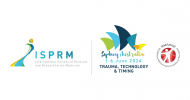Session outline
Rehabilitation is an important enabler for quality of life and participation in the community. In 2023, the World Health Assembly endorsed the historic resolution on strengthening rehabilitation by expanding and integrating rehabilitation in national health systems as part of Universal Health Coverage (UHC), emphasizing it in primary care and as part of emergency preparedness. However, many emerging countries are facing the dual challenge of inadequate rehabilitation trained personnel and the overwhelming need for such specialists in the face of natural disasters, armed conflicts, ageing population and following diseases and trauma. Although many emerging countries have made great strides in providing primary care to its population, they continue to struggle in providing rehabilitation care and education. This includes creating infrastructures and curriculum, teaching and assessment tools to rehabilitation physicians, nurses, physical, occupational, speech and psychological therapists. There have been many successful attempts to share rehabilitation knowledge, skills and experience between individuals and organizations from countries with well-established rehabilitation services and countries without it. An example is Montefiore-Einstein’s program in providing rehabilitation services and education in Iraq, Jamaica and helping China develop a cardiac rehabilitation program.
PMR physicians from South Asia have formed an informal organization, South Asian Physiatrists from North America, (SAPNA). This group consists of PMR physicians, trainees and medical students, many of whom have trained both in USA and a South Asian country. SAPNA aims to help provide support and mentorship to its members and form collaborations with physiatrists from South Asia.
In this workshop, we plan to address the following:
- Assessing the needs of physiatrists from emerging nations:
Dr Raju DhakaL, Director of the Spinal Injury Rehabilitation Center in Nepal and Dr Binod Shah, Pain Specialist at Montefiore Medical Center, NY who also trained in Nepal will discuss the challenges and barriers faced by PMR physicians in developing countries. They will include feedback from physiatrists at a Pain conference they organized recently in Nepal.
- Education: Assessing the preparedness of physiatrists from emerging nations to create and lead rehabilitation teams
Dr Maya Therattil, Pathway Director for PMR at Drexel Medical School and who has worked as a physiatrist both in India and USA will discuss the strengths and weakness of PMR education using India as a model. She will also discuss the integration of physiatrists in hospitals with long-established physiotherapy departments. She will discuss strategies to create more cohesive rehabilitation teams.
- Strengthening PMR education and Leadership:
Dr Huma Naqui, PMR physician who trained in Pakistan will discuss her work in helping awareness of physiatry which led to her creating of the first PMR residency in Iraq.
Learning outcomes
- Understand the challenges and barriers faced by rehabilitation as a field and by the physiatrists in South Asian countries. This knowledge may be helpful to physiatrists from other Asian and African countries and to those from developed nations who wish to collaborate with physiatrists from emerging nations.
- Elucidate the infrastructure and personnel needed to establish clinical service and, or educational programs for PMR resident and allied services (PT,OT,ST, etc)
- Provide examples of successful strategies used by the speakers to create or expand existing PMR programs and services in several different South Asian countries.
Target audience
- Allied health
- Medical practitioners
- Students
- Trainees
- Nursing staff
- General public


